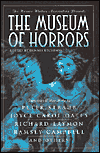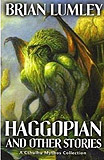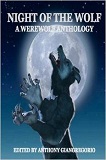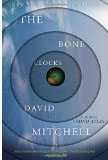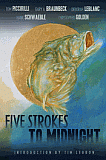
Five Strokes to Midnight, edited by Gary Braunbeck, Hank Schwaeble
Book Review by Pete S. Allen
Have you read this book?
I love anthologies -- if you've read previous reviews of mine, you know this. I'm a sucker for the short story and novella, and any collection of these is good; even if some of the bits aren't great, the thing as a whole gets some slack from me, because hey, it's an anthology, and again, in case you missed it, I love anthologies.
Five Stroke to Midnight is the inaugural book from Haunted Pelican Press, and according to the website, will be the first of many anthologies, each featuring five authors -- "four well-known writers of dark fiction, as well as one newcomer to the field." This in particular seems to be the theme of the anthology overall, as each author was told to choose their own theme and submit 20,000 words of fiction on that theme. This is a bit of a risky adventure, lacking the more concrete structure found in other anthologies, and part of that risk is having a somewhat disjointed overall picture. I think that happened somewhat here -- the five themes of the book are, 'loss,' 'hauntings,' 'curses,' 'demons,' and 'folklore.' What these five have to do with each other or the five strokes to midnight isn't really clear, but that could be me being nitpicky. The stories are the thing.
Let's get to it. Please note I am purposefully keeping the details about the stories in the book to a minimum, and will focus on writers and styles, and how successful these are -- a plot info dump for a short story can spoil it pretty quickly. So, the five authors involved are Tom Piccirilli, Gary Braunbeck, Deborah LeBlanc, Hank Schwaeble, and Christopher Golden. Of these, I've only previously read Gary Braunbeck's work, which I enjoy, so I was looking forward to reading some new (to me) authors and I expected the quality to be high -- guilt by association and all that.
Tom Piccirilli's got two stories in the book, both centered around the idea of loss. The first story is called simply "Loss" and recounts the story of a failed writer, in competition (at least in his own mind) with an old friend he hasn't spoken with in years. My hackles go up when the main character in a story is a writer, and this was certainly the case with this one initially, but Piccirilli's writing is stark and lovely, and his characterization incredibly sympathetic and the story soon swept me along, away from my more cynical reading tendencies. The second story, "Bereavement," centers around that most horrific of realities, the loss of a loved one, or worse, many loved ones. The narrator in this tale recognizes grief for its importance to the psyche, and so learns a means of dealing with his grief, in a tragic and admirably horrifying way.
Gary Braunbeck is up next in the book, with a trio of interwoven tales set in his city of Cedar Hill, Ohio, where 'weird shit regularly happens,' (paraphrasing) and in this case will be the hauntings of his chosen theme. If you've read any of Braunbeck's Cedar Hill stories, or indeed any of his writing, you know that he can establish a rapport between you and his characters in a matter of a paragraph or so, and you're at the mercy of whatever happens next right there with them. "Afterward, There Will Be a Hallway," is the first and longest of the stories, featuring a man haunted by ghosts he's only just meeting, some he's known for a while, and some he can't reach. Two things make this one of the best ghost stories I've ever read -- one, the ghosts learn, which happens occasionally, but usually ends up with them fulfilling their mission and buggering off. In this case, that ain't necessarily so, but ...I'll stop there. The second thing about this story is that it presents the most unique and new rationale for hauntings and ghosts I've seen. Fresh is good.
"The Queen of Talley's Corner," and "Listening to Hendrix Sing '1983... A Merman I Should Turn to Be,'" are the next two stories, following in sequence and as mentioned, also set in Cedar Hill. Both are lovely pictures of other aspects of haunting, "Queen" involving a love lost and bittersweet storyline, and "Listening" more vignette than full-on story, but both of these are still impressive stories of beautiful prose, and together give a nice, easy decrescendo from the emotional involvement of "Afterward...".
Next, Deborah LeBlanc gives us "Curses," with her stories "White-Hot" and "Bottom Feeder." This is the most disappointing part of the book. While LeBlanc can tell a story, the stories she tells aren't particularly original in either concept or telling, and are marred by clunky prose and disappointing cliché. "White-Hot" gives us a down-on-his-luck, but darned good looking construction worker beholden to a fat, horny, witch of the bayou. He is cursed indeed, and stupid, but stupid in that horror movie trope sort of way; although to be fair to him, the rules aren't really defined all that well, and he ends up getting the shaft in more ways than one. "Bottom Feeder" gives us another morbidly obese, and so evil, bayou woman out to curse someone, but this time the buxom young female victim really doesn't earn the curse. Perhaps this is why she gets some help from the ghost daughter (the daughter's a ghost? A surprise to everyone but the reader). Some of the clunkier bits of writing in both of these stories ("it was like snorting a cocktail of warm rotted meat, vomit, and something metallic,") make them seem like older, unpublished stories hurriedly dusted and sent off without the proper care, and that's disappointing.
Hank Schwaeble is next with "demons" and he offers up some interesting ones. While not as polished a writer as Braunbeck or Piccirilli (he is, after all, the newcomer), he can tell a story, and his prose is more polished and his ideas fresher than LeBlanc's. "Midnight Bogey Blues" gives us a demon-haunted serial killer, whose driving motivation is perhaps more virtuous than one might expect -- although the results are not noticeably different in the end. "Bone Daddy" is a pretty amusing tale, mixing up some of the mythoi of mummies and mommies. Although again, the results are expected, the fun is in the getting there. Finally, "Gomorrah" gives a bit of come-uppance to a few who deserve it, and again, mixes some of the stories we've expected to hear. Schwaeble's stories are full of action and device, but suffer somewhat from a complete lack of sympathetic character. Reading about these folks is like watching a lab experiment on a particularly loathsome insect -- you might flinch at some moments, but you're still more interested in seeing what's going to happen than in stopping the experiment. And when all is said and done (and dead), it's no great loss.
Finally, Christopher Golden brings up the rear with a trio of stories in his theme of "folklore," which would have better been named "legend" as that's more what these stories revolve around, but that's me being persnickety and academic (plus "legend" sounds cooler than "folklore" in context). "Shaft 39," "Under Cover of Night," and "All Aboard" all impart the wisdom of being aware of and paying your damn respect to the legends around you. "Shaft 39" gives us a story of trapped miners, the ghost miner, and the complete arbitrary nature of fate, whimsically doling out life and death. "Under Cover of Night" takes a look at the southern US border, and the challenges of people on both sides, up to and including the chupacabra. "All Aboard" deals with love and loss, and people's inability to deal with these -- and a phantom train. What Christopher Golden does with all of these legends is outstanding, in that the legends give us a new lens in which to look at the characters impacted by them, and more, the situations they're in. "Shaft 39" is as much about the horrible, inescapable cycle of life, work and death in the mining communities in West Virginia as it is about ghosts in the mines. "Under Cover" displays the border, the people guarding it, the coyotes exploiting it, and the people caught between them -- it's a toss up which monster will get them. And "All Aboard" is a heartbreaking tale, not only of parenthood, but childhood, spouse-hood, and the asshole-hood of the work-hood. And there's ghost trains! Does it get any better?
Overall, Five Strokes to Midnight is a great book, and an impressive debut from Haunted Pelican Press. There's some bumps in the road, but there's a good sample in here from some very talented authors, and it's well worth the read for fans of the horror and dark fantasy genres, or anyone who likes some great ghost stories.
Five Stroke to Midnight is the inaugural book from Haunted Pelican Press, and according to the website, will be the first of many anthologies, each featuring five authors -- "four well-known writers of dark fiction, as well as one newcomer to the field." This in particular seems to be the theme of the anthology overall, as each author was told to choose their own theme and submit 20,000 words of fiction on that theme. This is a bit of a risky adventure, lacking the more concrete structure found in other anthologies, and part of that risk is having a somewhat disjointed overall picture. I think that happened somewhat here -- the five themes of the book are, 'loss,' 'hauntings,' 'curses,' 'demons,' and 'folklore.' What these five have to do with each other or the five strokes to midnight isn't really clear, but that could be me being nitpicky. The stories are the thing.
Let's get to it. Please note I am purposefully keeping the details about the stories in the book to a minimum, and will focus on writers and styles, and how successful these are -- a plot info dump for a short story can spoil it pretty quickly. So, the five authors involved are Tom Piccirilli, Gary Braunbeck, Deborah LeBlanc, Hank Schwaeble, and Christopher Golden. Of these, I've only previously read Gary Braunbeck's work, which I enjoy, so I was looking forward to reading some new (to me) authors and I expected the quality to be high -- guilt by association and all that.
Tom Piccirilli's got two stories in the book, both centered around the idea of loss. The first story is called simply "Loss" and recounts the story of a failed writer, in competition (at least in his own mind) with an old friend he hasn't spoken with in years. My hackles go up when the main character in a story is a writer, and this was certainly the case with this one initially, but Piccirilli's writing is stark and lovely, and his characterization incredibly sympathetic and the story soon swept me along, away from my more cynical reading tendencies. The second story, "Bereavement," centers around that most horrific of realities, the loss of a loved one, or worse, many loved ones. The narrator in this tale recognizes grief for its importance to the psyche, and so learns a means of dealing with his grief, in a tragic and admirably horrifying way.
Gary Braunbeck is up next in the book, with a trio of interwoven tales set in his city of Cedar Hill, Ohio, where 'weird shit regularly happens,' (paraphrasing) and in this case will be the hauntings of his chosen theme. If you've read any of Braunbeck's Cedar Hill stories, or indeed any of his writing, you know that he can establish a rapport between you and his characters in a matter of a paragraph or so, and you're at the mercy of whatever happens next right there with them. "Afterward, There Will Be a Hallway," is the first and longest of the stories, featuring a man haunted by ghosts he's only just meeting, some he's known for a while, and some he can't reach. Two things make this one of the best ghost stories I've ever read -- one, the ghosts learn, which happens occasionally, but usually ends up with them fulfilling their mission and buggering off. In this case, that ain't necessarily so, but ...I'll stop there. The second thing about this story is that it presents the most unique and new rationale for hauntings and ghosts I've seen. Fresh is good.
"The Queen of Talley's Corner," and "Listening to Hendrix Sing '1983... A Merman I Should Turn to Be,'" are the next two stories, following in sequence and as mentioned, also set in Cedar Hill. Both are lovely pictures of other aspects of haunting, "Queen" involving a love lost and bittersweet storyline, and "Listening" more vignette than full-on story, but both of these are still impressive stories of beautiful prose, and together give a nice, easy decrescendo from the emotional involvement of "Afterward...".
Next, Deborah LeBlanc gives us "Curses," with her stories "White-Hot" and "Bottom Feeder." This is the most disappointing part of the book. While LeBlanc can tell a story, the stories she tells aren't particularly original in either concept or telling, and are marred by clunky prose and disappointing cliché. "White-Hot" gives us a down-on-his-luck, but darned good looking construction worker beholden to a fat, horny, witch of the bayou. He is cursed indeed, and stupid, but stupid in that horror movie trope sort of way; although to be fair to him, the rules aren't really defined all that well, and he ends up getting the shaft in more ways than one. "Bottom Feeder" gives us another morbidly obese, and so evil, bayou woman out to curse someone, but this time the buxom young female victim really doesn't earn the curse. Perhaps this is why she gets some help from the ghost daughter (the daughter's a ghost? A surprise to everyone but the reader). Some of the clunkier bits of writing in both of these stories ("it was like snorting a cocktail of warm rotted meat, vomit, and something metallic,") make them seem like older, unpublished stories hurriedly dusted and sent off without the proper care, and that's disappointing.
Hank Schwaeble is next with "demons" and he offers up some interesting ones. While not as polished a writer as Braunbeck or Piccirilli (he is, after all, the newcomer), he can tell a story, and his prose is more polished and his ideas fresher than LeBlanc's. "Midnight Bogey Blues" gives us a demon-haunted serial killer, whose driving motivation is perhaps more virtuous than one might expect -- although the results are not noticeably different in the end. "Bone Daddy" is a pretty amusing tale, mixing up some of the mythoi of mummies and mommies. Although again, the results are expected, the fun is in the getting there. Finally, "Gomorrah" gives a bit of come-uppance to a few who deserve it, and again, mixes some of the stories we've expected to hear. Schwaeble's stories are full of action and device, but suffer somewhat from a complete lack of sympathetic character. Reading about these folks is like watching a lab experiment on a particularly loathsome insect -- you might flinch at some moments, but you're still more interested in seeing what's going to happen than in stopping the experiment. And when all is said and done (and dead), it's no great loss.
Finally, Christopher Golden brings up the rear with a trio of stories in his theme of "folklore," which would have better been named "legend" as that's more what these stories revolve around, but that's me being persnickety and academic (plus "legend" sounds cooler than "folklore" in context). "Shaft 39," "Under Cover of Night," and "All Aboard" all impart the wisdom of being aware of and paying your damn respect to the legends around you. "Shaft 39" gives us a story of trapped miners, the ghost miner, and the complete arbitrary nature of fate, whimsically doling out life and death. "Under Cover of Night" takes a look at the southern US border, and the challenges of people on both sides, up to and including the chupacabra. "All Aboard" deals with love and loss, and people's inability to deal with these -- and a phantom train. What Christopher Golden does with all of these legends is outstanding, in that the legends give us a new lens in which to look at the characters impacted by them, and more, the situations they're in. "Shaft 39" is as much about the horrible, inescapable cycle of life, work and death in the mining communities in West Virginia as it is about ghosts in the mines. "Under Cover" displays the border, the people guarding it, the coyotes exploiting it, and the people caught between them -- it's a toss up which monster will get them. And "All Aboard" is a heartbreaking tale, not only of parenthood, but childhood, spouse-hood, and the asshole-hood of the work-hood. And there's ghost trains! Does it get any better?
Overall, Five Strokes to Midnight is a great book, and an impressive debut from Haunted Pelican Press. There's some bumps in the road, but there's a good sample in here from some very talented authors, and it's well worth the read for fans of the horror and dark fantasy genres, or anyone who likes some great ghost stories.
|
Click here to buy Five Strokes to Midnight, edited by Gary Braunbeck, Hank Schwaeble on Amazon
|
Five Strokes to Midnight, edited by Gary Braunbeck, Hank Schwaeble on Amazon

| More Books You Might Like |
Comment on Five Strokes to Midnight, edited by Gary Braunbeck, Hank Schwaeble
| Comments on Five Strokes to Midnight, edited by Gary Braunbeck, Hank Schwaeble |
| There are no comments on this book. |
